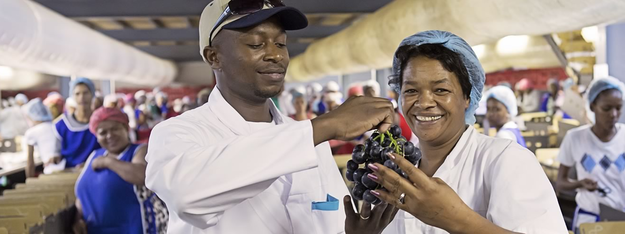“It’s all very normal right now. It’s been a good start to grapes, a week earlier for us,” says Laurent Borel-Saladin, co-director of the family business Dew South in Wellington, along the Berg River. “We’ve had good climatic conditions so far.”
Grapes have been moving on the European market which is firm, buoyed by Peru’s deviation to fill the gap in California, but unlike the industry as a whole, that’s not Dew South’s major focus.
“We’ve tried to position ourselves for alternate markets like China, South East Asia, Malaysia and the new varieties have helped us,” he says.
Over the last four years they have changed 30% of their table grape surface to what he calls the “sexy varieties”; new cultivars that are not all tried and tested, he comments, but that’s what the market wants.
“As an industry we’re still striving to really penetrate China where volumes are still relatively small when you look at the population size. And there’s cold steri which tends to tire the product plus quite a long travel time.”
Through their exporters they’re sending increasing amounts of red seedless grapes to Africa, while Canada is attractive but high-risk: it’s a long way off and there’s no plan B if something goes wrong.

Economies of scale become ever more important
Yield on their two farms Roodezandt and Sandrif dropped during the period of accelerated renewal, but this year volumes are restored to previous levels.
Benefits of the new generation table grapes are its fertility – although that can be a danger, he remarks, when too much is put on the line by accident – and the reduced amount of cultivation necessary while on the vine.
“Traditional varieties need to be worked 12 to 15 times in the vineyard. With these new varieties there are no small berries and they respond better to thinning practices.”
Getting back to bigger volumes is crucial. “Economies of scale are playing a larger and larger role in the industry. Small and medium size guys like me are under threat. If you’re doing a million cartons of table grapes, then you’re deriving benefits of scale.”
He continues: “Labour costs have gone up extremely, at a rate far beyond inflation. It’s hard, but we have a country with 40% employment and by increasing minimum wage you are stifling new employment.”
From the period when grape packing stops until vineyard preparation in late winter, the majority of their seasonal staff is unemployed and receive government welfare. The employment provided by export fruit farms has become critical to rural communities in the Boland.
Weighing up alternatives to Cape Town
Three years ago they found out after the grape season that there had been a catastrophe at the harbour. “Now we go into the season knowing there’s a problem.”
Alternatives to loading out from the container terminal in Cape Town, are the conventional vessels at a private terminal in Cape Town or taking the fruit to ports further away, especially if the fruit is going to the East.
“You weigh up the costs of going to Port Elizabeth or to Durban versus how long your product is going to just stand in Cape Town harbour. For the moment we’re doing just fine – if it can just stay this way.” For more information:
For more information:
Laurent Borel-Saladin
Dew South
Tel: +27 21 873 1664
Email: info@dew-south.co.za
https://dew-south.co.za/
